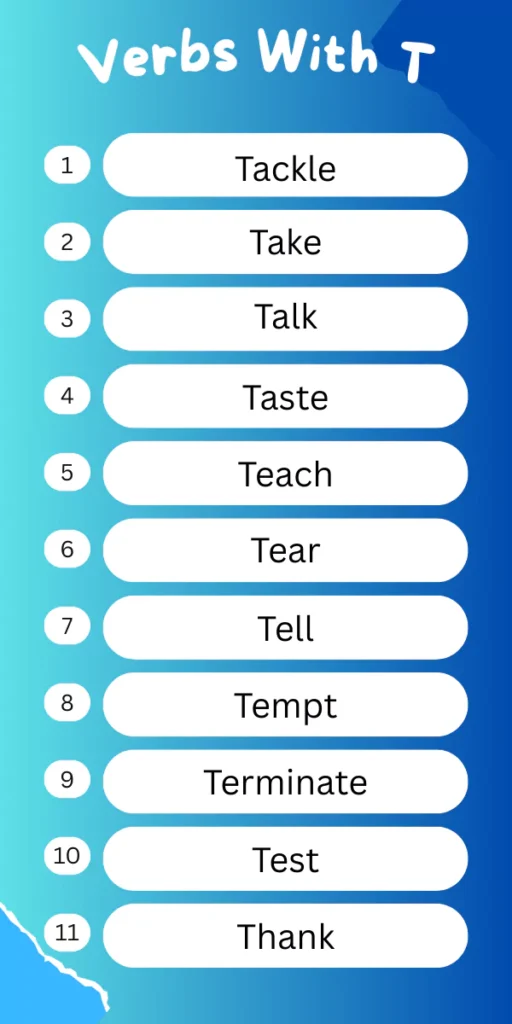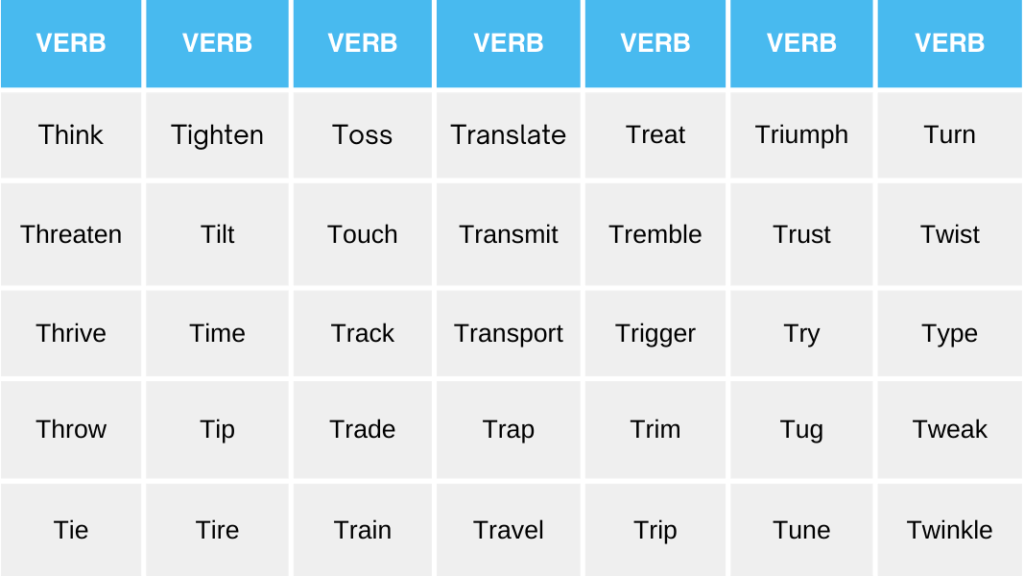Verbs That Start With T – List, Meanings, and Examples in English

Verbs beginning with the letter T carry a unique sense of energy, movement, and transformation. As the backbone of sentences, verbs breathe life into our language by driving action, expressing thought, and capturing change. The letter T contributes a powerful dynamism, introducing verbs that range from bold physical actions to subtle emotional or intellectual processes. Whether you’re writing to inspire, persuade, or simply describe, verbs that start with T can add clarity, strength, and impact to your expression.
List of Verbs That Start With T
The list of verbs starting with T is rich and diverse, offering words that embody growth, determination, creativity, and everyday action. From simple terms like talk and travel to empowering ones like thrive, transform, and tackle, these verbs help us articulate both the ordinary and the extraordinary. Exploring this list not only expands your vocabulary but also enhances your ability to communicate ideas with precision and power.

Common Verbs Starting With T
- Take – To get into one’s possession.
Example: She will take her books from the shelf. - Talk – To speak in order to exchange ideas.
Example: They talk every morning over coffee. - Teach – To impart knowledge or skills.
Example: She teaches math at the local school. - Tell – To communicate information.
Example: Please tell me the truth. - Think – To use one’s mind to consider or reason.
Example: I think it will rain today. - Try – To make an attempt.
Example: He will try to finish the project on time. - Travel – To go from one place to another.
Example: They love to travel around the world. - Turn – To move in a circular direction.
Example: Please turn left at the next corner. - Talk – To converse with someone.
Example: We need to talk about the plan. - Touch – To make physical contact.
Example: Do not touch the hot pan. - Throw – To propel something with force through the air.
Example: He will throw the ball to his friend. - Treat – To act toward someone in a certain way.
Example: Always treat others with respect. - Track – To follow the course of something.
Example: The hunters tracked the animal’s footprints. - Takecare – To look after something or someone.
Example: She takes care of her younger brother. - Tie – To fasten with a cord or knot.
Example: He tied his shoelaces before running.
Positive Verbs Starting With T
| Verb | Meaning | Example |
|---|---|---|
| Thrive | To grow, develop, or succeed | The garden thrives in the summer sun. |
| Treasure | To value something highly | She treasures her grandmother’s necklace. |
| Trust | To have confidence in someone or something | We trust our team to do their best. |
| Transform | To change into something better or new | The new manager transformed the company. |
| Triumph | To achieve victory or success | The team triumphed over their rivals. |
| Thank | To express gratitude | I thank you for your kindness. |
| Tackle | To deal with a problem or challenge | She tackled the difficult task with courage. |
| Team | To join with others for a purpose | We teamed up to finish the project. |
| Tune | To adjust for harmony or balance | The musician tuned the guitar beautifully. |
| Teach | To guide someone in learning | He teaches children with patience. |
| Train | To prepare or instruct | They train athletes for competitions. |
| Talk | To communicate and share ideas positively | We talked about our future goals. |
| Triangulate | To find clarity or balance through perspective | She triangulated opinions before making a decision. |
| Touch | To connect emotionally | The story touched everyone’s heart. |
| Testify | To affirm or bear witness truthfully | He testified to her honesty and integrity. |
Action Verbs Starting With T
- Throw – To hurl something with force.
Example: He threw the ball across the field. - Tackle – To seize and bring down (in sports) or handle an issue.
Example: She tackled the problem head-on. - Track – To follow and monitor.
Example: The police tracked the suspect’s location. - Train – To exercise or practice a skill.
Example: He trains every day for the marathon. - Tear – To rip apart or damage.
Example: She tore the paper accidentally. - Tap – To strike lightly.
Example: He tapped on the door politely. - Tie – To fasten together.
Example: They tied the boat to the dock. - Turn – To move in a different direction.
Example: Turn the wheel to the right. - Test – To try or examine something.
Example: The doctor tested the new medicine. - Talk – To speak or converse.
Example: They talked for hours on the phone. - Travel – To move or go from one place to another.
Example: We traveled across Europe last year. - Transfer – To move something from one place to another.
Example: Please transfer the files to this folder. - Trigger – To cause an event to occur.
Example: The alarm triggered when the door opened. - Toss – To throw lightly.
Example: She tossed the keys onto the table. - Tread – To step or walk on.
Example: He tread carefully on the icy path.
Regular Verbs That Start With T
- Talk – Talked – To converse.
Example: We talked about our plans. - Touch – Touched – To make contact.
Example: She touched the soft fabric. - Travel – Traveled – To go from place to place.
Example: They traveled to Paris last summer. - Try – Tried – To attempt.
Example: He tried his best in the exam. - Treat – Treated – To behave toward or give care.
Example: The doctor treated the patient kindly. - Turn – Turned – To change direction.
Example: She turned left at the intersection. - Talk – Talked – To communicate.
Example: We talked about the event. - Tie – Tied – To fasten with a knot.
Example: He tied the gift with ribbon. - Tap – Tapped – To strike lightly.
Example: He tapped on the window. - Tidy – Tidied – To clean or arrange neatly.
Example: She tidied her room before guests arrived. - Touch – Touched – To handle or contact.
Example: Don’t touch the wet paint. - Talk – Talked – To chat or speak.
Example: We talked for hours last night. - Test – Tested – To examine.
Example: The scientist tested the theory. - Track – Tracked – To follow.
Example: They tracked the package online. - Thank – Thanked – To express gratitude.
Example: She thanked her teacher for the help.
Irregular Verbs Starting With T
- Take – Took – Taken – To get or grab.
Example: She took the book from the shelf. - Teach – Taught – Taught – To instruct or educate.
Example: He taught English for 10 years. - Tear – Tore – Torn – To rip or split.
Example: She tore the paper in half. - Tell – Told – Told – To communicate or narrate.
Example: He told a funny story. - Think – Thought – Thought – To reason or consider.
Example: I thought about your suggestion. - Throw – Threw – Thrown – To hurl through the air.
Example: He threw the ball across the field. - Thrust – Thrust – Thrust – To push with force.
Example: The knight thrust his sword forward. - Tread – Trod – Trodden/Trod – To step or walk.
Example: He trod carefully on the wet floor. - Troubleshoot – Troubleshot – Troubleshot – To find and solve a problem.
Example: She troubleshot the computer issue quickly. - Takeover (verb) – Take – Took – Taken in sense of control.
Example: The company was taken over by a bigger firm. - Thrive (historically irregular: throve–thriven, now often regularized) – To flourish or prosper.
Example: The plants thrived in sunlight. - Thrust – Thrust – Thrust – To insert or push.
Example: He thrust the letter into her hands. - Think – Thought – Thought – To believe or imagine.
Example: She thought it was a good idea. - Tell – Told – Told – To inform.
Example: Please tell me your name. - Teach – Taught – Taught – To guide learning.
Example: She taught them to read.
Phrasal Verbs Starting With T
| Verb | Meaning | Example |
|---|---|---|
| Take after | To resemble someone | She takes after her mother. |
| Take apart | To dismantle | He took apart the engine. |
| Take back | To withdraw or retract | I take back what I said. |
| Take off | To rise (plane) or become successful | The business took off last year. |
| Take on | To accept responsibility | She took on a new project. |
| Take out | To remove or go on a date | He took her out for dinner. |
| Take over | To assume control | A new manager took over the department. |
| Take up | To begin a hobby or habit | He took up painting. |
| Talk down to | To speak condescendingly | Don’t talk down to children. |
| Talk into | To persuade | She talked him into joining the team. |
| Talk over | To discuss | We talked over the plan together. |
| Talk out of | To dissuade | I talked her out of quitting. |
| Turn down | To reject or lower | He turned down the job offer. |
| Turn up | To appear or increase | She turned up late to the meeting. |
| Turn in | To submit or go to bed | I turned in my assignment yesterday. |
Rare and Unique Verbs Starting With T
- Tantalize – To tease with something desirable.
Example: The aroma tantalized the hungry guests. - Transfix – To hold motionless with awe or fear.
Example: The performance transfixed the audience. - Transcend – To rise above or go beyond limits.
Example: Art can transcend cultural boundaries. - Torporize – To make sluggish or inactive.
Example: Heat torporized the workers in the afternoon. - Titillate – To excite pleasantly.
Example: The story titillated the readers’ imagination. - Thwart – To prevent or oppose successfully.
Example: They thwarted the enemy’s plan. - Torporate – To slow down or dull.
Example: Long speeches torporated the audience. - Temporize – To delay or act evasively to gain time.
Example: The politician temporized instead of answering. - Transmogrify – To change into a strange form.
Example: The character transmogrified into a monster. - Tatter – To tear into shreds.
Example: The old flag was tattered by the wind. - Truncate – To shorten by cutting.
Example: The article was truncated for space. - Trample – To crush by stepping heavily.
Example: The crowd trampled the flowers. - Tremble – To shake involuntarily.
Example: She trembled with fear. - Tinker – To attempt to fix or improve clumsily.
Example: He tinkered with the old radio. - Torporate – To dull or slow down.
Example: Monotony torporated their energy.

Popular & Impactful Verbs That Start With T
| Verb | Meaning | Example |
|---|---|---|
| Take | To grasp or acquire | Take this opportunity seriously. |
| Talk | To communicate verbally | We talked for hours last night. |
| Teach | To guide or educate | She teaches with passion. |
| Tell | To inform or narrate | Tell me your story. |
| Think | To reason or reflect | Think before you act. |
| Try | To attempt or make an effort | Always try your best. |
| Travel | To go on a journey | They love to travel the world. |
| Transform | To change for the better | Education transforms lives. |
| Thrive | To prosper and flourish | The business thrived despite challenges. |
| Triumph | To win or succeed | The team triumphed in the final game. |
| Trust | To rely on or believe | Trust is the foundation of relationships. |
| Treasure | To value deeply | I treasure our friendship. |
| Tackle | To confront a challenge | She tackled the issue head-on. |
| Turn | To change direction or focus | Turn your dreams into reality. |
| Thank | To express gratitude | Always thank people for their kindness. |
Fun Facts About Words Beginning With T
- “T” Is One of the Top 5 Most Common Letters in English – The letter T is the second most frequently used consonant (after “N”) and the third overall (after “E” and “A”). This is why so many common verbs and words start with T like take, talk, tell, think, try.
- Tongue Twisters Love “T” – Because of its sharp, quick sound, T is often used in tongue twisters: “Tiny Tim took two tarts to town.” Linguists note that T-words add speed and rhythm to speech exercises.
- Many “T” Words Are About Action and Movement – Words like turn, toss, tackle, travel, and tread show how T is linked to energy and activity. It’s one of the most “dynamic” starting letters in English verbs.
- “T” Has Ancient Roots in Symbols of Direction – In ancient alphabets, the letter T (from the Phoenician taw) was shaped like a cross, symbolizing a marker, sign, or direction. Even today, T-words like track and trace carry that idea of pointing or guiding.
- Tons of Positive Power Words Start With T – Many uplifting verbs like thrive, transform, triumph, treasure, trust, begin with T. This gives the letter a reputation as a motivational starter, often used in slogans and inspirational writing.
FAQs
Conclusion
Verbs that start with the letter T are some of the most powerful and versatile words in the English language. From everyday essentials like talk, take, and tell to inspiring choices like transform, thrive, and triumph, these verbs bring energy, direction, and clarity to our communication. Whether you’re a student, writer, or language enthusiast, expanding your vocabulary with “T” verbs can help you express action, emotion, and ideas more effectively.
